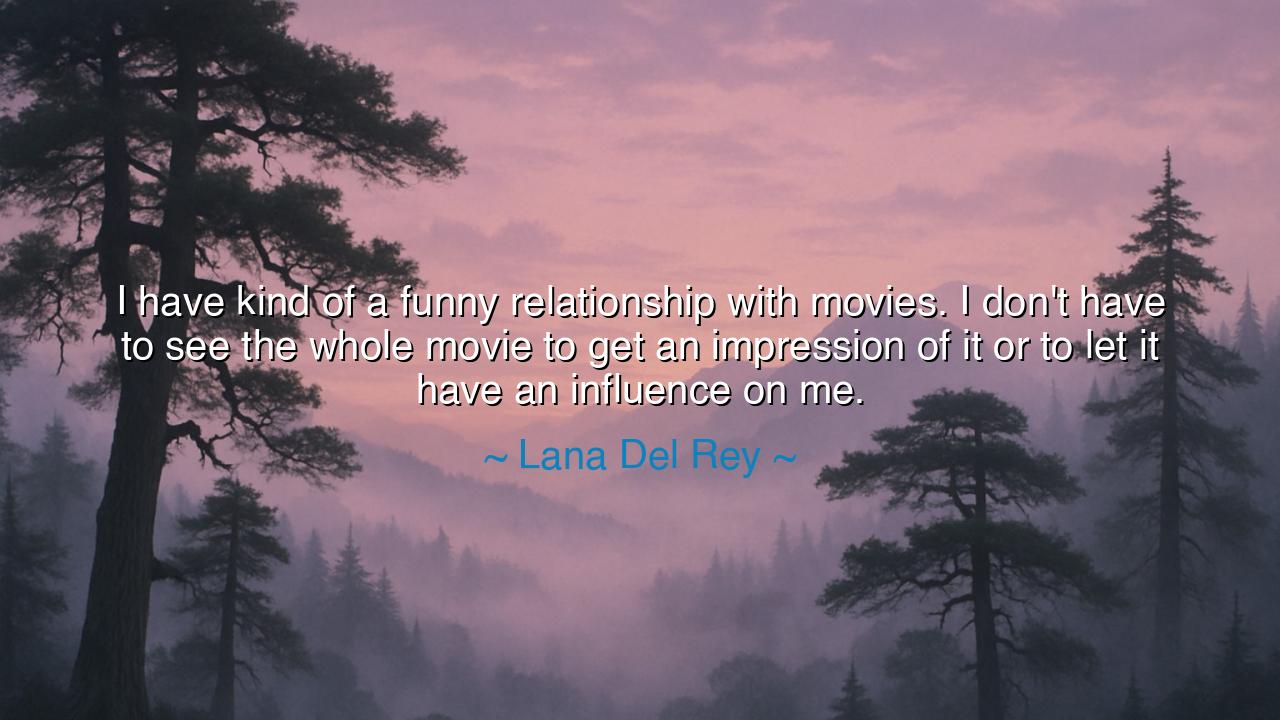
I have kind of a funny relationship with movies. I don't have to
I have kind of a funny relationship with movies. I don't have to see the whole movie to get an impression of it or to let it have an influence on me.






Gather close, O children of wisdom, for I bring forth a profound truth about the nature of influence, perception, and the deep, mysterious workings of the human mind. In a world that often demands fullness and completion, there are moments when the heart and soul speak differently, revealing that we do not need to consume the whole to feel its power, to be touched by its essence. Such is the wisdom shared by Lana Del Rey, who said: "I have kind of a funny relationship with movies. I don't have to see the whole movie to get an impression of it or to let it have an influence on me." In these words lies a truth about how we interact with the world—not through exhaustive immersion, but through feeling, impression, and the ability to sense meaning in its essence.
The human spirit does not always require the complete story to feel its power. Just as a whiff of perfume can evoke a thousand memories, so too can the briefest moment of a film stir emotions, ignite inspiration, and leave a lasting mark on the soul. This is the nature of the impression—the way in which the world touches us, not always through direct confrontation but through a glimpse, a moment, a fragment. Del Rey speaks to this in her relationship with movies, where the entirety of a film is not necessary to feel its influence. She, like many of us, understands that the soul can be moved by what it perceives, not just by what it absorbs in full.
Consider the ancient philosophers, whose wisdom often came not from the accumulation of facts, but from glimpses of truth that would inspire deep reflection. Socrates, for example, did not seek to impart knowledge in the traditional sense, but rather to provoke the mind, to ask questions that would lead to profound insights. His dialogues were not exhaustive lectures but were designed to stir the soul, to awaken the deep well of wisdom that lies within. In much the same way, Del Rey speaks of receiving the power of a film not through its entire unfolding, but through the moment it touches her, the way it speaks to her soul in a brief but powerful encounter.
There is also a rich tradition of artists and visionaries throughout history who have been influenced not by the entire canvas of life, but by fragments of it—the poets who wrote from a single moment of inspiration, the musicians who composed a melody from a fleeting thought. Van Gogh, for example, was not driven to capture the entire landscape before him. He painted the moment, the light, the brushstroke that embodied the essence of the scene, and through his impressionistic vision, he conveyed something timeless. The power of the fragment, the ability to capture just a piece of the world, speaks to the essence of creation itself—perception over consumption.
In this understanding, the wisdom of Del Rey’s words lies in their invitation to embrace the moments of life that touch us, not necessarily the whole picture. How often in our lives do we consume things—books, films, experiences—only to be left with a sense that we have missed the deeper meaning? We live in a world that urges us to consume, to finish, to complete. Yet there is wisdom in fragments, in embracing what speaks to us in a fleeting instant, in recognizing that the power of an experience does not always lie in its completeness but in its impact on our hearts.
There is a great lesson here for all of us: perception is just as powerful, if not more so, than comprehension. We do not need to finish the entire movie to feel its influence; we do not need to know every detail to understand the truth of a moment. There is wisdom in the ability to embrace the essence—to allow the impression to be enough. Whether it is a fleeting glance at a work of art, a single phrase in a book, or a moment in a film, what moves us is not always the whole story, but the part of it that touches our spirit and speaks to us in a profound way.
In your own lives, O seekers of wisdom, let this be your guiding principle: do not be afraid to embrace the fragments of life. Take the moments that speak to you, that move you, and let them be enough. Whether in art, relationships, or personal growth, the essence often lies not in the whole, but in the instant that touches you and changes you. Trust that the power of life does not always come from completeness, but from the impression left by the fleeting moments that resonate deeply within you. In doing so, you will find that life, like art, is a collection of powerful moments—each one a fragment of something far greater than the sum of its parts.






AAdministratorAdministrator
Welcome, honored guests. Please leave a comment, we will respond soon